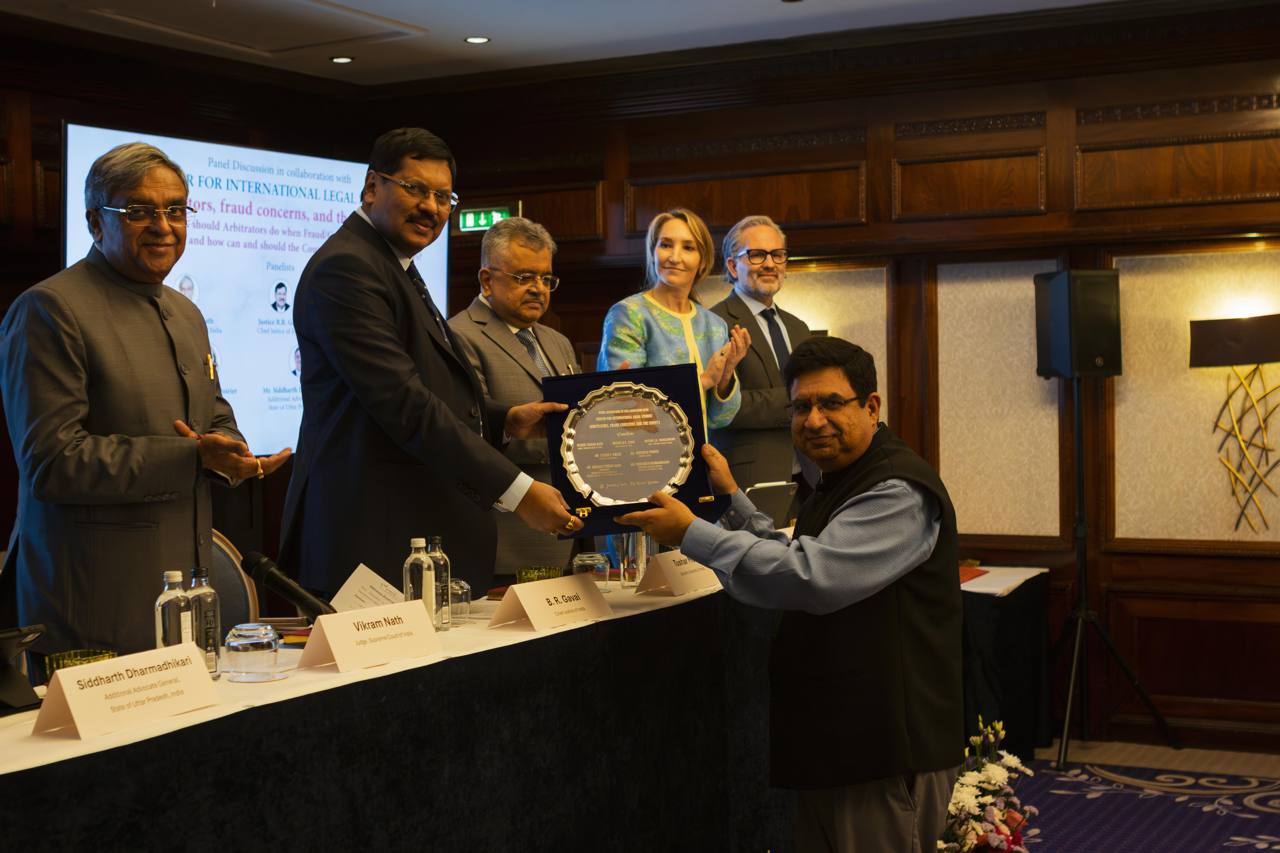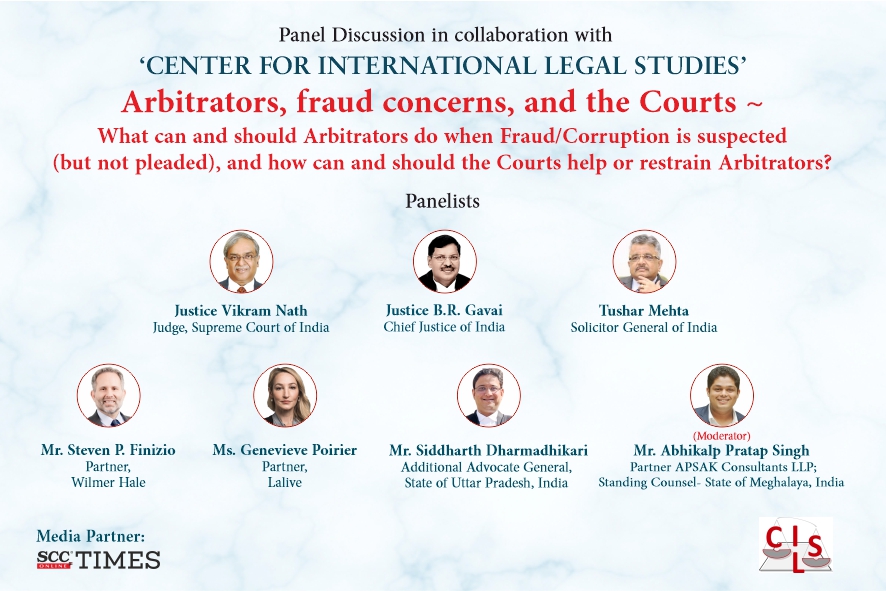London, June 4, 2025 — In a compelling international dialogue hosted in collaboration with the Center for International Legal Studies (CILS), a distinguished panel of jurists and legal experts convened in London to deliberate on the nuanced and increasingly critical theme:
“Arbitrators, Fraud Concerns, and the Courts — What can and should arbitrators do when fraud/corruption is suspected (but not pleaded), and how can and should the courts help or restrain arbitrators?”
The discussion brought into sharp focus the legal and ethical dilemmas faced by arbitrators when suspicions of fraud or corruption arise during arbitral proceedings—particularly in the absence of formal pleadings by the parties. The panel also examines the scope and limits of judicial intervention in supporting or restraining arbitral discretion in such complex and sensitive situations.

Esteemed Panelists Include:
- Justice B.R. Gavai, Chief Justice of India
- Justice Vikram Nath, Judge, Supreme Court of India
- Mr.Tushar Mehta, Solicitor General of India
- Mr. Steven P. Finizio, Partner, WilmerHale, London
- Ms. Genevieve Poirier, Partner, Lalive, London
- Mr. Siddharth Dharmadhikari, Additional Advocate General, State of Uttar Pradesh, India
The session was skillfully moderated by Mr. Abhikalp Pratap Singh, Partner at APSAK Consultant LLP and Standing Counsel for the State of Meghalaya, India.

The discussion commenced with a warm felicitation ceremony, followed by an inaugural address by Chief Justice of India, Justice B.R. Gavai, who formally opened the session.
Highlighting the growing relevance of arbitration, Justice Gavai remarked that,
“The inquisitive prominence of arbitration as a preferred mechanism for resolving commercial disputes has prompted a heightened focus on the integrity of the arbitration process, particularly in cases involving suspicion of fraud or corruption”.
He furthered that this concern becomes especially acute when public funds are at stake, such as when the party is a state.
“When arbitration is designed to be efficient and party-driven, it must not become a vehicle for shilly-nilly conduct or scrutiny. However, this rise in prominence also brings with it certain challenges”, he viewed.
Justice Gavai referred to the 2024 International Chamber of Commerce (ICC) Report on red flags and other indicators of corruption, emphasising the role of international arbitration in offering a structured methodology to identify and assess corruption risks.
He also referred to Abdul Kadir Shamsuddin Bubere v. Madhav Prabhakar Oak, 1961 SCC OnLine SC 138 and pointed out that historically, Indian courts were the largest among arbitrators to adjudicate matters involving fraud. Further, dealing with the non-arbitrability of fraud matters, he referred to another Supreme Court decision which held that complete fraud claims required detailed examining and they were more suitable for civil courts rather than arbitration courts.
Reflecting on the pro-arbitration stance, he highlighted that Indian jurisprudence soon emphasised the special and separability of arbitration clause from the main contract, reinforcing the idea that fraud in the main agreement does not necessarily render the arbitration clause inoperative.
He referred to the 246th report of the Law Commission of India on amendment to the Arbitration and Consolidation Act 1996, which suggested to introduce a blanket provision after sub-section 6 to Section 16 of the Arbitration Act restraining all the tribunals from exercising the power to make an award despite allegations of fraud. However, this proposal was never adopted by the Parliament.
Referring to Swiss Timing Ltd. v. Commonwealth Games 2010 Organising Committee, (2014) 6 SCC 677 , wherein it was declared the rather extreme judgment for enquiry for ignoring Section 8 and 16 of the Arbitration Act, which grants arbitrators the authority to rule on their own jurisdiction, he reflected that the court also highlighted that criminal proceedings do not bar arbitration and that the allegations of fraud do not derail the arbitration process eventually.
Continuing the discourse, Justice Vikram Nath further elaborated on the significance of fairness in dispute resolution. He remarked,
“I believe that irrespective of the difference in adjudicator, difference in forum or difference in the dispute resolution method adopted, fairness has to be considered the end all and beyond the holy grave of arbitration or else is a revolution system will always remain an alternative method and not a prioritised on.“
Justice Nath continued the discourse by highlighting the critical distinction between fraud occurring during arbitration and fraud in commercial transactions.
He explained, “An award obtained through fraud in arbitration is fundamentally different from fraud committed during the course of commercial transactions. The former involves the corruption of a process specifically designed to resolve disputes, which strikes at the heart of fairness and justice. Such an act undermines the integrity of the arbitration process itself, rendering it inherently unfair.”
Further, he emphasised the broader implications of such fraudulent practices, particularly in the context of international arbitration, where state parties are involved. He noted,
“When a state is a party to arbitration, particularly in developing countries like Nigeria, the consequences of fraud are not just legal or procedural; they directly impact public funds. A fraudulent award can have devastating economic effects, disproportionately burdening countries with fewer resources.”
He remarked, “A line has to be drawn, and arbitrator certainly cannot be expected to look and investigate into the concerns of fraud by themselves. They can merely flag a concern and then return the appropriate finding based on what each party brings forth and their evidence and arguments.“
Addressing the concerns of fraud in arbitration, Justice Nath outlined key factors that can be considered to safeguard the integrity of the process. At its most fundamental level, he emphasised the importance of ensuring that principles of natural justice are adhered to.
“The arbitrator must first and foremost ensure that the parties are given a full and reasonable opportunity to be heard,” Justice Nath remarked.
“This is the most rudimentary level of fairness that must be upheld in any arbitration procedure.”
Stressing on the neutrality, he said that the same is paramount for the arbitrator, especially in international arbitration.
Conclusively, he pointed out that the potential for fraud can be mitigated by ensuring that the procedural safeguards in place are robust and transparent. This includes a careful review of the arbitral process to ensure there is no manipulation of procedures or undue influence by either party.
Tushar Mehta, Solicitor General of India, further continued the discussion and remarked that he considered the topic under discussion to be highly relevant in the present circumstances. Mentioning it as a burning topic, Mr. Mehta, said that when fraud and corruption in the realm of arbitral proceedings are discussed, we are necessarily, and by and large, talking about arbitral proceedings arising out of a public entity like government, or a public sector undertaking and a private party.
“It is not unthinkable that private parties also can collude with each other, enter into a transaction and get the transaction legitimised by appointing an arbitrator and getting an arbitrary award, which is a quasi-judicial award which is enforceable in the Court of Law”, he remarked.
Discussing the same, he posed a question as to what would happen if the arbitrator were to notice such a collusion, which may be result of either fraud or corruption. He suggested that the arbitrator has to intervene. He owes a duty to himself, first and then to the parties to intervene.
However, he reflected on an issue which will persist before the arbitrator regarding to what extent will he (Arbitrator) do that specially when we are looking at the scenario where there are no pleadings because in either case of fraud or corruption, you need pleadings.
He added that, this would not mean that the arbitrator cannot go beyond the belief. Since, the arbitrator has a right under the governing statute to call for information, call for record call for documents, call for affidavits and you can even examine and cross examine witnesses on his own.
Conclusively, he opined that,
“Let us not turn our eyes from the fraud committed during the arbitral proceedings itself when the arbitral award is the result of the fraud”.
The next speaker, Genevieve Poirier, Partner at Lalive, London, offered her valuable insights on the issue at hand. She remarked “it is a topic that sits at the intersection between law and ethics and public trust, and so entirely pertinent. And the question what should arbitrators do when faced with indicia of fraud or indicia of corruption? It has never really been an academic question.”
She continued the discussion by outlining the framework in the following order: first, examining the arbitrator’s mandate—what it entails, its limits, and whether the arbitrator has a duty to act.
She expressed her interest in addressing an aspect not yet fully explored: how arbitral institutions or soft law guidance are grappling with these issues, specifically, how they advise arbitrators on what to look out for, how to reconcile overlapping duties and obligations, and how to manage emerging risks effectively.
Beginning with the arbitrator’s mandate and its limits, she stated:
“As we’ve heard, the arbitrator is appointed to resolve the dispute presented to them—the case brought forward by the parties. They may apply mandatory rules and must ensure that their award is enforceable, which includes avoiding any taint of illegality. Furthermore, they must maintain impartiality and avoid any appearance of bias.”
She acknowledged that resolving the dispute as framed by the parties becomes more complex when arbitrators encounter allegations of fraud or corruption. While acting on a clearly pleaded allegation is more straightforward, it becomes difficult when the tribunal itself perceives a risk. Should arbitrators then act on their own initiative?
She further emphasised that arbitrators lack the tools that courts possess. They are not criminal judges or investigative magistrates; their function is adjudicative rather than inquisitorial. Without investigative powers, they may be limited in their ability to gather evidence. While domestic courts at the seat of arbitration can, in some jurisdictions, assist tribunals in compelling evidence or securing witness attendance, this power has limits—particularly when witnesses or documents are located abroad.
She concluded that these are nuanced challenges. Arbitrators walk a fine line between maintaining procedural fairness and fulfilling their duty to issue an enforceable, legally sound award in cases where corruption or illegality might lurk beneath the surface.
Building on the previous points, Steven P. Finizio, Partner, WilmerHale, London emphasised that while much had been said about the limitations faced by arbitrators, it was equally important to acknowledge the nuanced but impactful powers they did possess, particularly the ability to shape the evidentiary burden. He reiterated that although arbitrators lacked the coercive authority of judges, they could still place parties in a position where failure to produce critical documents or records could effectively result in dismissal of their claims.
He underscored that this procedural leverage, though subtle, could be highly effective in disputes involving allegations of corruption or misconduct. Arbitrators could, for instance, require parties to substantiate the legitimacy of transactions where bribery or fraud was alleged. Failure to do so could be interpreted as a lack of cooperation, weakening the claimant’s position significantly.
He pointed out a concerning pattern—arbitrators often ruled against parties where corruption was suspected, yet avoided explicitly citing corruption as the basis for their decision. This reluctance, he explained, might stem from reputational concerns or the risk of non-reappointment, but it also led to a lack of transparency.
Steve concluded by calling for greater candour in arbitral reasoning. If a decision was driven by findings or suspicions of corruption, tribunals should not shy away from stating so explicitly. Doing so, he argued, would strengthen the legitimacy of arbitral awards and promote greater confidence in the process,
The discussion concluded on a thoughtful note, with participants reflecting on the complex balance between ensuring procedural fairness in arbitration and addressing serious concerns like fraud and corruption.
Siddharth Dharmadhikari, Additional Advocate General for the State of Uttar Pradesh, India, delivered the vote of thanks.


